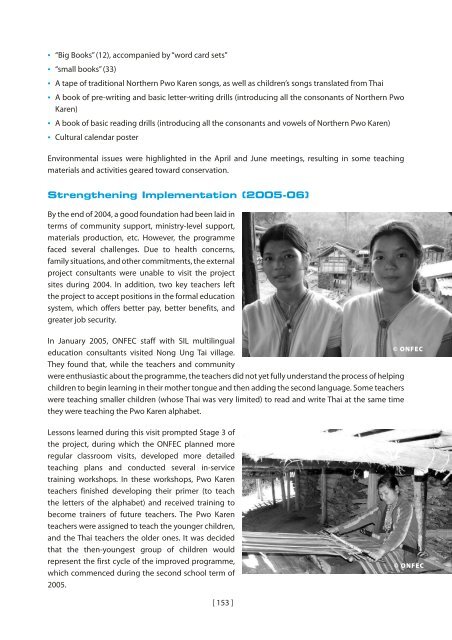Mother Tongue-based Literacy Programmes: Case Studies of Good ...
Mother Tongue-based Literacy Programmes: Case Studies of Good ...
Mother Tongue-based Literacy Programmes: Case Studies of Good ...
You also want an ePaper? Increase the reach of your titles
YUMPU automatically turns print PDFs into web optimized ePapers that Google loves.
••••••“Big Books” (12), accompanied by “word card sets”“small books” (33)A tape <strong>of</strong> traditional Northern Pwo Karen songs, as well as children’s songs translated from ThaiA book <strong>of</strong> pre-writing and basic letter-writing drills (introducing all the consonants <strong>of</strong> Northern PwoKaren)A book <strong>of</strong> basic reading drills (introducing all the consonants and vowels <strong>of</strong> Northern Pwo Karen)Cultural calendar posterEnvironmental issues were highlighted in the April and June meetings, resulting in some teachingmaterials and activities geared toward conservation.Strengthening Implementation (2005-06)By the end <strong>of</strong> 2004, a good foundation had been laid interms <strong>of</strong> community support, ministry-level support,materials production, etc. However, the programmefaced several challenges. Due to health concerns,family situations, and other commitments, the externalproject consultants were unable to visit the projectsites during 2004. In addition, two key teachers leftthe project to accept positions in the formal educationsystem, which <strong>of</strong>fers better pay, better benefits, andgreater job security.In January 2005, ONFEC staff with SIL multilingualeducation consultants visited Nong Ung Tai village.They found that, while the teachers and communitywere enthusiastic about the programme, the teachers did not yet fully understand the process <strong>of</strong> helpingchildren to begin learning in their mother tongue and then adding the second language. Some teacherswere teaching smaller children (whose Thai was very limited) to read and write Thai at the same timethey were teaching the Pwo Karen alphabet.© ONFECLessons learned during this visit prompted Stage 3 <strong>of</strong>the project, during which the ONFEC planned moreregular classroom visits, developed more detailedteaching plans and conducted several in-servicetraining workshops. In these workshops, Pwo Karenteachers finished developing their primer (to teachthe letters <strong>of</strong> the alphabet) and received training tobecome trainers <strong>of</strong> future teachers. The Pwo Karenteachers were assigned to teach the younger children,and the Thai teachers the older ones. It was decidedthat the then-youngest group <strong>of</strong> children wouldrepresent the first cycle <strong>of</strong> the improved programme,which commenced during the second school term <strong>of</strong>2005.© ONFEC[ 153 ]

















